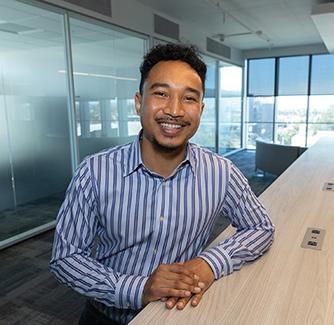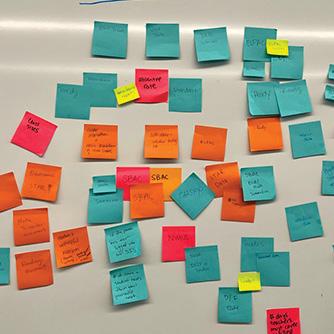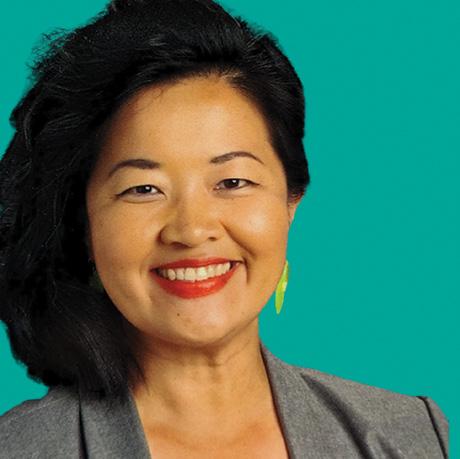
« PLI taught me to draw a very clear throughline to educational equity—it taught me the importance of explicitly making the values connection in everything we do. »
—ALYSSE CASTRO, PLI COHORT 3, ALAMEDA COUNTY SUPERINTENDENT OF SCHOOLS



« PLI taught me to draw a very clear throughline to educational equity—it taught me the importance of explicitly making the values connection in everything we do. »
—ALYSSE CASTRO, PLI COHORT 3, ALAMEDA COUNTY SUPERINTENDENT OF SCHOOLS


School leadership centered on social justice requires a commitment to continuous improvement, innovation, and transformation. Researchers agree that school principals are second only to teachers in their impact on student achievement and play a critical role in sustaining an inclusive school culture and activating school reform efforts. As the needs of TK–12 schools expand in response to ever-shifting demographics, health and safety concerns, and the persistent inequitable outcomes for underrepresented populations, leader preparation with an explicit focus on equity and social justice is essential.
Now more than ever, our schools need justice-oriented leaders who are prepared to meet the myriad of challenges facing students, families, and teachers. We

need leaders who know how to create conditions where teachers feel valued and supported to continually grow in their practice and where student learning and well-being is the top priority in our work every day. Leaders who take up this charge create and sustain a collaborative school culture and hold the unwavering belief that we can do better by our students. This work is not easy, but it has the potential to change educational outcomes for generations to come.
Are you ready to begin your journey to become a leader for equity and justice?
Soraya Sablo Sutton DIRECTOR, PRINCIPAL LEADERSHIP INSTITUTE, BERKELEY SCHOOL OF EDUCATIONThe California State Legislature established Principal Leadership Institutes at UC Berkeley and UCLA in 1999 through the passage of a California State Assembly bill to help address teacher and principal shortages across the state.

Since its inception, the Principal Leadership Institute (PLI) at Berkeley School of Education has trained, inducted, and supported more than 650 leaders with a focus on improving equitable outcomes for the most marginalized and underserved populations.

PLI students earn a Master’s Degree in Educational Leadership and a Preliminary Administrative Services Credential in just 14 months. The course of study includes a rigorous and intensive schedule designed to provide challenging content—delivered through a variety of teaching and learning modalities—in order to ensure solid preparation for the role of school site administrator.
• Work full-time while taking evening and weekend courses.
• Join a cohort model that fosters community.
• Engage in conventional coursework as well as clinical fieldwork in your current school or district.
• Take courses that emphasize a theory-to-practice connection and a problem-based pedagogical model that reflects current realities in our schools.
• Learn from university faculty, PK–12 experts, and a trained leadership coach.
PLI program FAQ: principals.berkeley.edu/faq
A description of our signature pedagogy can be found in Laying the Foundation: A Framework for Integrating Performative Modalities in Social Justice School Leadership Programs

After more than 22 years since the launch of PLI, we wondered how many of our alums are still working in the field of education. The answer was pretty astonishing: some 98 percent.

Knowing that the work of school principals and district leaders is increasingly challenging, how is it that PLI graduates are able to sustain themselves in the field? This longevity may be due to the intensive and extensive preparation, a support system that offers ongoing professional development and guidance, and a sustaining PLI network that graduates continually draw upon— even through a pandemic and other socio-political and environmental challenges.
« I was pushed in PLI to engage in deep identity work through an asset-based lens, which helped shift my sense of who I am and what I bring to the table as a leader. Being authentically rooted drives my ‘why’ and sense of purpose in the work. There are numerous learnings I bring with me from PLI, but to name just a couple: I draw on concepts of (re)framing, distributed leadership, and courageous conversations.
—SOO HYUN HAN-HARRIS, TALENT DIVISION COORDINATOR, RETENTION AND EMPLOYEE DEVELOPMENT, OAKLAND UNIFIED SCHOOL

DISTRICT,
» PLI COHORT 20
PLI grads lead for equity in schools, districts, and beyond
PLI grads lead for equity in schools, districts, and beyond
78% OF PLI GRADUATES WORK IN PUBLIC SCHOOLS
98% OF PLI GRADUATES STILL WORK IN THE FIELD OF EDUCATION
81% OF PLI GRADUATES SERVE BAY AREA SCHOOLS AND DISTRICTS
Upon completing the Administrative Services Credential, PLI students are prepared to take on a variety of positions as school site leaders and district office administrators, as well as positions working for equity in education in the nonprofit and private sectors.

SAN FRANCISCO UNIFIED SCHOOL DISTRICT | 94
OAKLAND UNIFIED SCHOOL DISTRICT | 55
WEST CONTRA COSTA UNIFIED SCHOOL DISTRICT | 38
BERKELEY UNIFIED SCHOOL DISTRICT | 21
SAN MATEO COUNTY | 16
NONPROFIT | 13
ALAMEDA UNIFIED SCHOOL DISTRICT | 11
HAYWARD UNIFIED SCHOOL DISTRICT | 11
SAN LORENZO UNIFIED SCHOOL DISTRICT | 10
UC BERKELEY | 10
« Readings, instructors, and my classmates consistently pushed my thinking and have been instrumental in my continuous endeavor to be a more humble and intentional listening leader, especially in the areas of shared decision-making, thoughtful change management, and receiving and providing feedback. » —ERIN DEIS, COLLEGE & CAREER READINESS SUPERVISOR, DIVISION OF CURRICULUM AND INSTRUCTION, SAN FRANCISCO UNIFIED SCHOOL DISTRICT, PLI COHORT 16
*Numbers from a survey of 525 alums who responded in fall 2020

For more than two decades, PLI has successfully recruited, trained, and supported a diverse group of aspiring school leaders. A typical PLI cohort comprises more than 50 percent BIPOC future leaders. Considering that only 34 percent of California school principals are people of color, PLI strives to have a direct and immediate impact on diversifying the leader workforce to advance excellence and equity in education for all students.
We seek applicants with a range of leadership experiences who have a desire to work in historically underserved schools. We encourage applicants from underrepresented racial/ethnic backgrounds, gender identities, and languages. We hope to admit students who represent the diverse backgrounds of the school populations they will serve.
« PLI is a well that I deliberately and subconsciously draw from. Knowing how to be equity-centered—not just in speaking or writing, but in the specifics of how racism impacts schools and school systems— is a foundation of PLI. » —PAUL
KOH, ASSISTANT SUPERINTENDENT, STUDENT SUPPORT SERVICES, WAKE COUNTY PUBLIC SCHOOL SYSTEM, PLI COHORT 9EARLY SEPTEMBER
PLI information sessions begin
MID-SEPTEMBER Application opens
MID-DECEMBER
Application deadline
EARLY FEBRUARY
Notification of interviews
MID-FEBRUARY Applicant interviews
EARLY MARCH
Financial aid deadline
MARCH
Preliminary acceptances
APRIL
Final acceptances
MAY
Pre-seminars begin
MID-JUNE Program begins
For current dates, see Timeline for Application Cycle at principals.berkeley. edu/apply

• At least five years of full-time classroom teaching or pupil personnel services experience, with verification
• Basic Skills Requirement (e.g. passing score on California Basic Education Test: CBEST)
• Current valid California clear teaching or pupil personnel services credential
• High-quality teaching experience, evidenced by a recent teaching video
• Admissions essays demonstrating commitment to justice-oriented school leadership
• Three letters of recommendation attesting to the applicant’s leadership experience and potential
• Minimum undergraduate GPA: 3.0. Applicants who do not meet the minimum GPA threshold may still be considered for admissions; for details, see Entrance Exams/Academic Potential at principals.berkeley.edu/apply Apply principals.berkeley.edu/apply
53 percent of our alums are people of color
As Interim Principal at Berkeley High School in Berkeley Unified School District, Tonia Coleman (PLI Cohort 14) works closely with teachers, students, and support staff in creating a positive school culture and climate with high expectations and high support.


« PLI has impacted my leadership by emphasizing the importance of collective leadership and relationships. Strong trusting relationships with colleagues, teachers, students, and families are instrumental in providing access to opportunity and success for all students, identifying systemic issues that need to be dismantled, and supporting the needs of struggling students in the classroom and at the organizational level. Collective leadership and trusting relationships, which are both premier tenets of the PLI program, have led to effective organizational change and positive school culture and climate. »
In her position as Senior Director of Talent Development, Recruitment & Retention at Oakland Unified School District, Sarah Glasband (PLI Cohort 15) is responsible for sourcing, cultivating, and supporting employees across roles in the district, including creating pathways to support the development of BIPOC educators and staff.

« Rooting my work in my vision and values is critical to the success of team leadership. . . . I learned through PLI and LSP to strategically work with others, to buffer, to build bridges, to be tactical, to delegate—to build a team I can have a ride-or-die feeling with because we share the same values and vision. I learned how to clarify roles and responsibilities, how to let go and when to hold on, and how to work in service of a more racially equitable culture. »

In his position as Middle School Network Superintendent in Oakland Unified School District, Cliff Hong (PLI Cohort 8) hires, trains, and supports school leaders to fulfill the mission of ensuring that all students receive a world-class education and have a joyful experience in our schools.


« PLI transformed me as a leader. Before experiencing the program, I was dataand systems-oriented, but PLI helped me to better understand that leadership is first and foremost about people. Through PLI, I practiced pushing systems and society to create educational communities that serve all students, but particularly those who have been historically disempowered and marginalized. PLI helped me articulate my mission as a leader in schools. »
In her role as Principal at Jefferson Elementary in San Leandro Unified School District, Natalie Valencia (PLI Cohort 17) oversees the daily operations of the school site and works with students, families, and staff to maintain a positive school culture.




« The first time I ever felt that my identity was viewed as a strength was during my time in the Principal Leadership Institute. School should feel that way for everyone, and it is because of the PLI that my leadership is rooted in creating schools that are welcoming to all. I learned to look at the principal’s role through a new lens, one where I serve as a facilitator who empowers others to become leaders and build a sustainable school system. »
Janine Marcoux (PLI Cohort 21) served in a cabinet-level position as the Director of Early Childhood Education for Robla School District in Sacramento, providing leadership and oversight for a large California State Preschool Program of more than 250 students, before joining the 21st Century California School Leadership Academy’s UTK Leadership Initiative as a trainer.
« I lean on the foundation I gained from PLI almost daily. I often refer back to readings, intentional learning experiences, and thoughtful discussions from the program that grounded me in the work of social justice leadership and helped to cultivate my leadership identity. Through PLI, I learned to harness the power of “we” and the importance of honoring the collective wisdom of our communities so that we can partner together to disrupt the status quo, transform systems, and hold equity at the core. »
As a fifth grade teacher at Tara Hills Elementary in West Contra Costa Unified School District, Gerardo Palafox-Just (PLI Cohort 13) prioritizes encouraging and supporting students, helping them find their voices and build their confidence so they can better tackle any academic challenge.


« PLI has allowed me to have more of a panoramic perspective of my work in education. Although my work today focuses on the outcomes of one classroom, I’m able to recognize more clearly how the inequities of our school, district, state, national, and global systems directly affect the daily lives of the students in that classroom. There are innumerable leadership lessons that continue to inform my practice. Exercising the economy of words, for example, has made me a more careful and precise listener to the needs of the people around me. Also, adaptability and flexibility continue to be my lifeline, ensuring my success within the educational system. »
In her role as Principal at Hopkins Middle School in Fremont Unified School District, Nancy Kuei (PLI Cohort 17) strengthens relationships, understanding of student needs, and shared leadership across staff, students, and families to drive school improvement actions together.



« PLI’s balanced approach that is both research-based and practice-oriented helped me see the power of formal and—more importantly—informal systems that impact the school every day. Our PLI experience with courageous conversations, leading with a clear “why,” and using different data to effectively tell a narrative, are some of the many lessons that still impact me and help with my reflections daily. »
In her position as A–G Improvement Coordinator for West Contra Costa Unified School District’s College and Career Department, Jessica Petrilli (PLI Cohort 12) coordinates the work of California’s A–G Improvement Grant and works with administrators, counselors, and teachers to improve A–G eligibility for students.
« PLI has made me think about everything through a lens of equity and advocacy. My PLI lessons remind me to maximize the potential I see, collaboratively problem solve, and remain creative, flexible, and resilient in the face of the most daunting challenges. PLI lessons also remind me that systems change requires both building collective capacity and individual agency, and I use that approach in my role in supporting site administrators, counselors, and teachers across the district. »

Principal Leadership Institute Berkeley School of Education University of California, Berkeley 2121 Berkeley Way Berkeley, CA 94720-1670 principals.berkeley.edu
Copyright © 2023 UC Regents.
PHOTO CREDITS cover, 5, 15 Andrea Lampros. 2 Bart Nagel Photography. 3, 6 Bryan Gibel. 4 Teerasak Anantanon. 7 Monkey Business Images/Shutterstock. 9 Rowan Jack. 10 Jessica Evans. This publication is for educational purposes only and may contain material as allowed by the United States copyright fair use doctrine.
« PLI is doing the deep work of preparing leaders for the unprecedented challenges we face in our schools, especially for students who are historically resilient in schools with fewer resources. We continually cultivate the leaders who endure through challenging times and indeed thrive. » —PROFESSOR JABARI MAHIRI, FACULTY DIRECTOR, LEADERSHIP PROGRAMS, BERKELEY SCHOOL OF EDUCATION
LEFT Professor Jabari Mahiri and Rashaan Curry (PLI Cohort 21) at commencement

